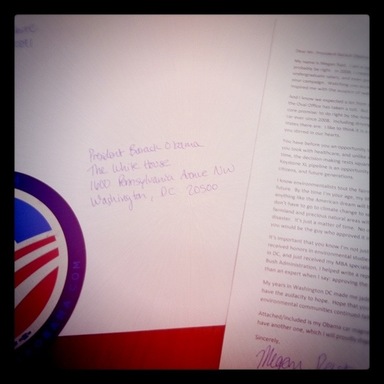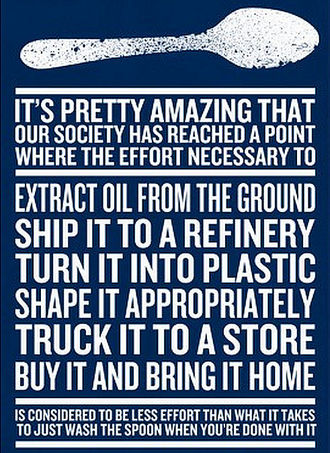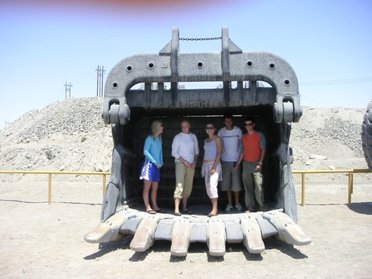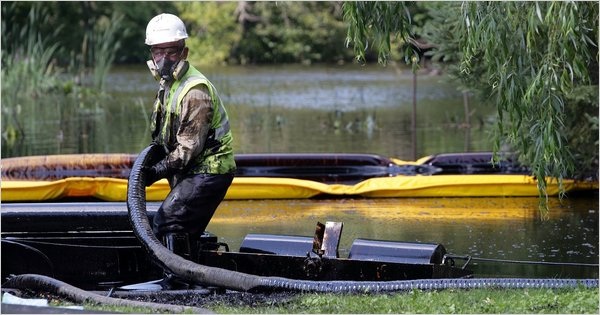Despite being pretty much not an activist (future post on that later), it got me fired up and ready to go. I wrote this letter to our President with my Hope bumper magnet (complete with dirt!) in a plea to not approve this disastrous pipeline. So what is it? And what's the big deal?
Repeat after me: the Canadians couldn't get through a pipeline on their own soil to the West/Pacific route (aka why are WE taking the risk they wouldn't do themselves?), tar sands oil is more energy intensive and harmful to the planet requiring us to evaluate our societal direction (answer: it's time to wean ourselves off of oil, not just for the planet but for the power/politics/money that flow with it), the economics are not beneficial (it will create only temporary jobs and a handful permanently, as well as the major issue of externalities).
This one is a doozy, so hold onto your butts enviroish friends!
The reason the Keystone XL really gets me fired up is for the following reason that almost NEVER gets talked about in the press: Canadians had a much shorter, western "Northern Gateway" route through British Columbia and it was not done for the environmental costs and risks and because of the extreme opposition by the British Columbia government, despite the fact it would make WAY more sense for shipping this oil to China (which is where it's going regardless of port. You can hold off on the "securing America's oil supply" comments). Such things as British Columbia government support become important when it comes to local/provincial permitting. The pivot and push for Keystone XL was largely due to the inability to get the Canadian route approved, not the other way around NatGeo, SMH.
Take a minute to let that really sink in...the Canadian government has been investing significant political resources lobbying for a much longer pipeline through the United States because their own people were so against it. You have to ask yourself, if Canadians are so against it, should we be? What is it they know that we don't?
As I was researching this blog post, it looks like the delays in Keystone XL have actually led to change in this area. The Canadian government approved the Northern Gateway pipeline over the summer, overtopping the provincial government resistance. It's going to be interesting to see that dynamic play out when you have such coordinated, across-the-political-spectrum resistance to this pipeline in British Columbia.
But again, the only question you should ask yourself: If Canadians who've been lobbied on this pipeline for a lot longer are this vehemently against it, maybe we need to reconsider what we're committing to before buyer's remorse. Here's a bit of what they know....
TAR SANDS OIL IS PARTICULARLY GNARLY: TIME TO WEAN OURSELVES OFF THE OIL TEAT
The other most important thing you need to understand about the Keystone XL pipeline is that the oil is not a liquid crude oil. Get the image of a pump that bobs up and down out of your head right now. Tar sands oil is basically intermixed "bitumen" with sand that in Canada has to be collected in large quantities via a strip-mining process, and then processed to squeeze the oil out of the sands. So think about it...it's a triple whammy environmentally. You are stripping away boreal forests in order to collect the stuff, damaging the entire ecosystem in ways that can't be repaired, then processing it in an energy intensive way in order to get it to market...where it will then be burned and add greenhouse gases into the atmosphere and harm our climate. (JS and MM: check out this Berkeley study on boreal forest carbon storage showing why this ecosystem is particularly important as a carbon sink. Go Bears!)
And you don't have to take my word on the carbon intensity of tar sands oil relative to other fuels. Take the word of James Hansen, leading scientist and climatologist for NASA:
"Moving to tar sands, one of the dirtiest, most carbon-intensive fuels on the planet, is a step in exactly the opposite direction, indicating either that governments don't understand the situation or that they just don't give a damn. People who care should draw the line" - Scientific American article, read more with data.
Basically, our need for oil is fueling (pun intended) the industry to extract it in harder and harsher ways for our planet. And at some point we have to pull back and ask if it's worth it. I am a Catholic, but one commonality of every faith tradition as far as I know is the belief in human free will and the application of values to exercise that free will (holla Pope Francis, can't WAIT for the eco encyclical in 2015! but I digress...). What has happened to our values? At what point do we question our use of oil or any resource to the impact it is having? When did the stewardship of our planet become so undervalued compared to the exercise of our free will to do whatever we want? (I really want to say "whatever the f*** we want"...but that is totally off brand in the same paragraph as Pope Francis...)
IMO, James Hansen is right....we need to draw this line to shock our society out of this dangerous complacency at least.
Transportation and mobility infrastructure take a while to change so our transition from gasoline and diesel isn't reasonable to expect overnight (good comment JS!). But did you know that the primary driver of growth in oil last year was industrial use of petrochemicals due to cheap domestic supply? Do we really need so much plastic permeating our economy of products at the costs of irreparable harm to a major ecosystem and our climate? Mama always said (and I believe!) an ounce of prevention is worth a pound of cure.
Is it true that the Alberta oil sands are getting exploited anyways? Yes.
Is it true that the Keystone XL pipeline that is so contentious is (in part) an extension of the existing pipeline that runs to Nebraska? Yes.
Is it true that this oil will still get used but go over other transportation methods which are more inefficient? Yes.
Is it true that some of this oil will get trucked which is not only inefficient but also more carbon intensive? Yes.
Those things are true, and they can be used to justify moving forward (economic costs not accounted for though, more on that in final section below the jump). But we're living in a crazy world that behaves about people causing climate change the same way we smoked like chimneys before it was widely acknowledged cigarettes cause cancer. At some point, you have to draw a line and make a stand on values and force a conversation on the true costs of these choices on our ability to keep living on this planet.
This is a micro-level "plastic spoon rant" (thank you FutureEconomy), but it does a good rep of the insanity of our societal mindset that I can really appreciate:
I've visited one of the largest uranium mines in the world (pictured below). There is value to responsible resource extraction for human progress. I'm a believer, however, that the value of what we are extracting needs to be balanced against the social and environmental damage, and that those costs need to be accounted for and paid as part of the pricing. The Alberta tar sands do not meet these criteria....and how does one make that determination you ask? I'm really glad you asked because there's this thing called externalities...
Ok, I really wanted to put this one first, but I felt like we all needed to be on the same page about the tar sands extraction and the history of the Keystone XL pipeline. Because those are important foundations to this discussion I'm about to have in three ways: jobs, risks/spills costs, and carbon externalities.
Jobs: It's a Lie, Stay Smart America!
One of the thing that TransCanada bandies about ad nauseam for years is how many jobs the pipeline would create. The CEO has been quoted repeatedly saying it would create 42,000 jobs, and not just on their promo website, but also in adverts they've been spending thousands on air, and even repeating the lie on air THIS PAST SUNDAY on ABC (which he took back). This lie makes me, literally, insane. And not only because it's really only a few thousand temporary construction jobs and 20-50 permanent ones, and not only because academics at Cornell suggest it might actually kill more jobs that it creates, but because THIS LIE IS BEING USED INTENTIONALLY TO MISDIRECT THE PUBLIC CONVERSATION ABOUT THIS ISSUE. Because if TransCanada can get you thinking there are a lot of jobs this pipeline will create, especially after the great recession we're not quite out of, then this project gets perceived as "a job creator" which can make you think it's worth the environmental risk. Well, please take the job creation bullshit off the table right now, because it's a lie being used to make you say SQUIRREL and you are a smart cookie. You now have an immunity shot against this so we can focus and talk turkey about what we really should be economically. Let's talk about the externalities of this beeswax....
Risk and Spill Costs: Irreparable Damage, Disruption, and Unbelievable Expenses (Taxpayers Get to Pay Where Companies Leave Off!)
Now here's where I roll up my sleeves into my background. I have to tell you that I worked on the onshore oil and gas regulation while I was a contractor for the EPA, so I know a thing or two about the cost of spills vs. the protection measures in place of facilities (not pipelines, but the principles are the same). The short answer is: prevention measures get beefed up after serious spills, and then over the intervening years get eroded away by concerted lobbying efforts by industry, regardless of how little it costs (we're talking prevention measures that are PENNIES PER BARREL....and since a barrel of oil hasn't gotten below $70 in the last decade, the average person would think that's worth it).
Why does that matter? Well that answer is two-fold. First, it means that we tend to overestimate the protective measures that exist on an oil pipeline or storage facility. Thanks to years of GOP "anti-EPA" rhetoric, people have a shockingly low understanding of how Federal regulation actually works for environmental issues. People think that our regulation operates under the 'precautionary principle', meaning that if there's a risk something catastrophic will happen, we build regulation to mitigate that risk. And somehow magically all those people in Washington DC are busy over-regulating against damage that might happen. That is NOT the case, our Federal regulations are almost exclusively reactive, meaning only after something catastrophic happens that shock the American public into caring do we tend to put a regulation in place at all (and again, industry waits until we stop caring and then lobbies for reductions). Therefore, there tend to be huge blindspots that become the #1 focuses of lobbying by industry to maintain so they can save, literally, pennies on the barrel. Greed is not so good, Gordon Gecko!
Second, the properties of oil tar sands crude are far more damaging when they do spill. I have to carefully word this section, because a study by the National Research Council found that the chemical makeup of the tar sands is not more corrosive in the pipeline (directly contradicting environmental groups that say spills per mile have increased for this crude, and the study ignored a CA finding that high temperature pipelines increase spills). But everyone agrees, the National Research Council study did not evaluate the spill history (citing spill data as insufficient) nor did it look at the consequences of a spill from this type of crude (citing it as out of scope).
And there is a spill history already. A really bad track record, to be honest. The Keystone 1 pipeline that runs from Canada to the MidWest already has 14 leaks, and the Enbridge pipeline through Kalamazoo carries the same crude and had many unreported leaks before it's BIG ONE in 2010.
Exactly how different are spills of Alberta tar sands oil? The 2010 spill of over one million gallons crude oil into the Kalamazoo River closed 35 miles of the river for two years of cleanup that has cost the company over $1 billion in cleanups....cleanups that are still ongoing after community activism to push for doing it right and a 2014 EPA finding that Enbridge underestimated the amount of oil and ordered more dredging. (No one should be surprised that companies like to minimize their costs, even when it's their fault). Residents had to move out of their homes for months because the volatile hydrocarbons they mix with the bitumen to make it flow in a pipeline evaporate and pollute the air....and what's left is heavy and sinks to the bottom of waterways making it hard to cleanup.
Clocking in at direct Enbridge costs of $1.21 billion, the Kalmazoo River spill is the costliest in the history of the U.S. And that ignores the costs born by taxpayers to handle the spills and the long-term impacts on the local economy.
Now think about this...the Keystone XL runs over the Ogallala Aquifer. This underground water source not only hydrates the local folks, but is the irrigation for 30% of our food in this country. That means every third bite you take depends on this water being clean for consumption. The impact of a potential spill has been hotly contested by TransCanada (Google results will confuse you on this one), and considering the scale of impact, they have fantastic reasons to fight that are all connected to their corporate bottom line.
But here's a great summary from a journalist who changed from supporting the pipeline publicly (to the ire of environmentalists!) and switched to being an opponent because of Ogallala:
"The aquifer is feet deep. Not thousands of feet deep. I mean feet deep over this this territory in Nebraska. This pipeline if it’s constructed just like every other pipeline, it will leak. It’s an absolute. It will leak. … So the question is this, America. Do you want to risk — does the President of the United States want to risk damaging the aquifer, and I’m talking about irreversible damage. This isn’t something the oil companies will be able to come in and fix the aquifer. No. When that oil, if and when it does get in there, now what are we going to do? You are going to make void the farm economy in this part of the country. That’s the risk." [emphasis added] - Ed Shultz
How ready are you for this to be the water source of our nation's food supply?
Courtesy of NY Times
So this topic is last for a reason, because it makes everyone's eyes glaze over. There are no gross oil spill photos or panic button topics like Ogallala. But the personal and environmental impact is billions of times greater than a localized oil spill, and therefore it's worth your consideration. Hang in, I'll make it quick painful like a bandaid!
First, you have to get your head around a negative externality. An externality is an economic term meaning there are costs or benefits in the making of a product that are not included in the price of that product. The easiest, simplified way to think of it is in an unregulated market if we had a manufacturing plant making widgets that poured its waste into the local waterway or poured acrid/toxic air out of smokestacks. Not handling your waste is a lot cheaper, so the product is cheaper. The cost of that cleanup would be born by individuals or others, not by the company, so is external to the marketplace. (n.b. what's really neat about externalities, is if you do incorporate it into the cost of the product, it's usually the most efficient and inexpensive way to reduce. Want to know more? Nerd out on this topic thanks to Khan Academy....met him once too, love this guy!)
Carbon is the big, hairy, scary, environmental externality. We burn fossil fuels in millions of different places in our economy, and carbon is not captured at the "point source" aka the vehicles/power plants/etc that burn the fuels....so it goes into the atmosphere where it has impacts that literally impact every single person in one fashion or another.
How does this tie to tar sands oil? Well, one of the reason why it's so cheap is that the carbon cost is not incorporated. If we had a cost of energy that incorporated the energy intensity of the fuel and the carbon impact, tar oil sands would be horribly expensive and we would prefer renewables, or even less energy-intensive fossil fuels.
The most efficient way to incorporate this externality is a carbon tax. Which before you FREAK OUT, give peace a chance man. The cost of a carbon tax would be very small...academics put it at $2-5 per barrel, which is about what we pay in gas tax to maintain our roadways. Just that small amount would be enough to help curb our excesses and depending on the model, the tax income would either be redistributed to individuals or would go to subsidize energy efficiency measures or renewables which would further wean us off. There are conservatives working on a carbon tax, so I won't go into details here, but it's got enormous potential for efficiencies in our management of this issue. Enviroish LOVES IT.
Phew! Did you really make it this far in reading? Tell me if you did, I do try to be shorter, but this one got the best of me! Here's a cat photo in nature to say THANK YOU BELOVED READER WHO MADE IT TO THE BITTER END. MUAH!





 RSS Feed
RSS Feed